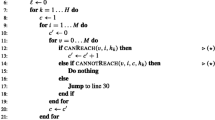Abstract
In search of the borderline between universality and non-universality of purely catalytic P systems, we prove that purely catalytic P systems with one catalyst are universal when inhibitors plus promoters or a priority relation among the rules plus promoters are used. The universality is also obtained for purely catalytic cooperating P systems with two catalysts (without any control on the use of rules). Some related open problems are also formulated.
Similar content being viewed by others
Explore related subjects
Discover the latest articles, news and stories from top researchers in related subjects.References
Alhazov A, Freund R, Heikenwälder H, Oswald M, Rogozhin Y, Verlan S (2013) Sequential P systems with regular control. In: Proceedings of 13th international conference on membrane computing, Budapest, Hungary, lecture notes in computer science. Springer, Berlin, 7762, pp 112–127
Bottoni P, Martin-Vide C, Păun Gh, Rozenberg G (2002) Membrane systems with promoters/inhibitors. Acta Inform 38(10):695–720
Dassow J, Păun Gh (1989) Regulated rewriting in formal language theory. Springer-Verlag, Berlin
Freund R (2013) Purely catalytic P systems: two catalysts can be sufficient for computational completeness. In: Proceedings of 14th international conference on membrane computing. Chişinău, Moldova, pp 153–166
Freund R, Kari L, Oswald M, Sosík P (2005) Computationally universal P systems without priorities: two catalysts are sufficient. Theor Comput Sci 330:251–266
Freund R, Păun Gh (2013) Universal P systems: one catalyst can be sufficient. In: Proceedings of 11th brainstorming week on membrane computing. Sevilla, Spain, pp 81–96
Freund R, Sosík P (2015) On the power of catalytic P systems with one catalyst. In: Proceedings of 16th international conference on membrane computing, Valencia, Spain, pp 121–133
Ibarra OH, Dang Z, Egecioglu O, Saxena G (2003) Characterizations of catalytic membrane computing systems. In: Proceedings of 28th international conference on mathematical foundations of computer science, Bratislava, Slovakia, Lecture notes in computer science, Springer, Berlin, 2747, pp 480–489
Ibarra OH, Dang Z, Egecioglu O (2004) Catalytic P systems, semilinear sets, and vector addition systems. Theor Comput Sci 312:379–399
Minsky ML (1967) Computation: finite and infinite machines. Prentice-Hall, Englewood Cliffs
Păun Gh (2014) Some open problems about catalytic, numerical and spiking neural P systems. In: Proceedings of 16th International conference on membrane computing, Chişinău, Moldova, lecture notes in computer science. Springer, Berlin, 8340, pp 33–39
Păun Gh (2000) Computing with membranes. Comput Syst Sci 61(1):108–143 (see also TUCS Report 208, November 1998, www.tucs.fi)
Păun Gh (2002) Membrane computing: an introduction. Springer-Verlag, Berlin
Păun Gh, Rozenberg G, Salomaa A (eds) (2010) Handbook of membrane computing. Oxford University Press, Oxford
Acknowledgments
This work was supported by the Innovation Scientists and Technicians Troop Construction Projects of Henan Province (154200510012), National Natural Science Foundation of China (61033003 and 61320106005), and Ph.D. Programs Foundation of Ministry of Education of China (20120142130008).
Author information
Authors and Affiliations
Corresponding author
Rights and permissions
About this article
Cite this article
Pan, L., Păun, G. On the universality of purely catalytic P systems. Nat Comput 15, 575–578 (2016). https://doi.org/10.1007/s11047-016-9567-0
Published:
Issue Date:
DOI: https://doi.org/10.1007/s11047-016-9567-0




